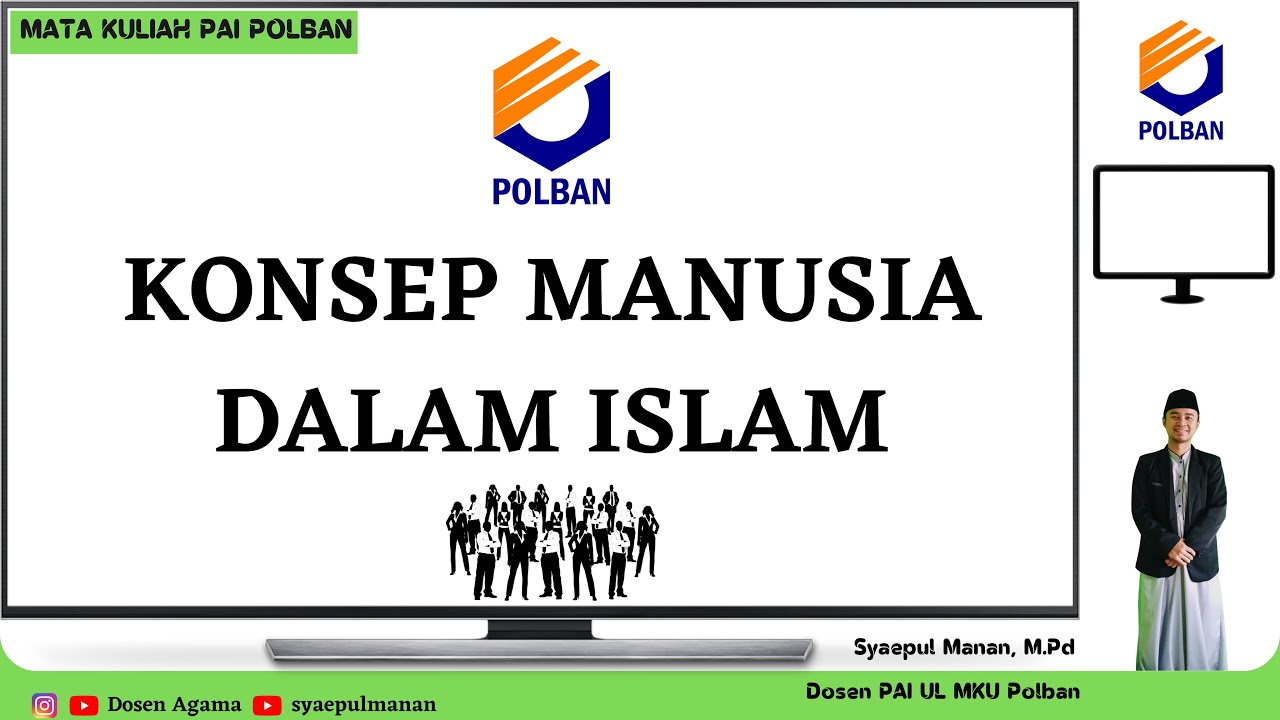UAI1A2 | PENDIDIKAN AGAMA ISLAM DAN ETIKA | PB03 | M5 | TUGAS, FUNGSI, DAN PERAN MANUSIA
Summary
TLDRIn this lecture, the instructor discusses the roles, duties, and functions of humans from an Islamic perspective, emphasizing the concept of 'Abid' (servant of Allah). The lecturer explains that human beings are appointed as khalifah (caretakers) on Earth, with a responsibility to fulfill their duties in worship and stewardship of the world. Key Quranic verses are cited to reinforce the idea that humanity must utilize its intellect, body, and spirit to serve Allah and maintain a just and prosperous society. The lecture encourages students to embrace their role as khalifah in managing both natural resources and human affairs responsibly.
Takeaways
- 😀 The speaker starts with a greeting in Arabic, acknowledging the audience with a warm 'peace and blessings' message.
- 😀 The primary focus of the lecture is on discussing the duties, functions, and roles of humans as creatures of Allah.
- 😀 The speaker highlights that humans are created by Allah to worship Him, emphasizing the role of human beings as servants of Allah.
- 😀 It is mentioned that worship is not limited to rituals such as prayer, zakat, fasting, and Hajj, but extends to every aspect of human life.
- 😀 The speaker refers to a key Quranic concept: humans are designated as 'Abid' (servants) of Allah, which is a high position, not merely a subservient role.
- 😀 Allah's omniscience is emphasized, with a reference to Quranic verses where He knows what humans do not know.
- 😀 The speaker discusses the concept of humans as 'Khalifah' (stewards or vicegerents) on Earth, emphasizing their responsibility to uphold justice and maintain a balanced life.
- 😀 Humans are entrusted with the role of managing the earth’s resources and ensuring that all actions are aligned with worshiping Allah.
- 😀 Quranic verses are cited to support the idea that previous generations acted as Khalifahs and were entrusted with responsibilities over the Earth.
- 😀 The lecture concludes with a call for students to understand and embrace their roles as Khalifahs, managing resources responsibly and fulfilling their duties towards Allah.
Q & A
What is the main focus of the lecture in the transcript?
-The main focus of the lecture is to discuss the roles, functions, and responsibilities of humans, particularly in relation to their position as God's creation and their role as stewards (khalifah) on Earth.
What does the term 'khalifah' refer to in the context of this lecture?
-'Khalifah' refers to the role of humans as God's representatives on Earth, tasked with managing the resources and affairs of the Earth responsibly and justly in accordance with divine guidance.
What is the significance of humans being described as 'Abid' by Allah?
-The term 'Abid' signifies that humans are servants of Allah, with the highest duty to worship and submit to Him. This position emphasizes the role of humans in dedicating their lives to fulfilling Allah's will and purpose.
What does the lecturer suggest about the nature of worship (ibadah)?
-The lecturer suggests that worship is not limited to rituals like prayer, zakat, fasting, and Hajj, but extends to every action in life, as long as it is done with the intention of serving Allah.
How does the lecturer describe the responsibility of humans as stewards of Earth?
-Humans are entrusted with the responsibility to manage the Earth’s resources wisely, ensuring that their actions contribute to the welfare of society and the fulfillment of their duties as khalifah.
What Quranic references are cited in the lecture to support the concept of humans as stewards?
-The lecturer cites various Quranic verses such as Surah Al-A'raf (7:172), Surah Al-Ahzab (33:72), Surah Sad (38:26), and Surah Az-Zumar (39:13), which highlight the concept of humans as stewards entrusted with divine responsibility.
What is the ultimate goal of fulfilling human roles as mentioned in the lecture?
-The ultimate goal is to achieve a just and prosperous society where all individuals live in accordance with Allah's will, maximizing their potential for the benefit of both humanity and the environment.
What does the lecturer emphasize about the connection between faith and human actions?
-The lecturer emphasizes that every action, regardless of how mundane, can become an act of worship if done with the intention to please Allah. This highlights the integration of faith in all aspects of life.
How does the concept of 'Amanah' relate to the role of humans as khalifah?
-'Amanah' refers to the trust or responsibility given by Allah to humans. As khalifah, humans are entrusted with the management of Earth’s resources, ensuring justice and fairness while fulfilling their duties as God's representatives.
What is the overall message of the lecture for the students?
-The lecture’s overall message is to encourage students to understand their roles as khalifah, the importance of fulfilling their responsibilities with sincerity, and to live their lives with the intention of serving Allah through every action.
Outlines

This section is available to paid users only. Please upgrade to access this part.
Upgrade NowMindmap

This section is available to paid users only. Please upgrade to access this part.
Upgrade NowKeywords

This section is available to paid users only. Please upgrade to access this part.
Upgrade NowHighlights

This section is available to paid users only. Please upgrade to access this part.
Upgrade NowTranscripts

This section is available to paid users only. Please upgrade to access this part.
Upgrade NowBrowse More Related Video

KONSEP MANUSIA DALAM ISLAM (ISTILAH MANUSIA DALAM ALQURAN , HAK DAN KEWAJIBAN)

Suprima, S.Pd.I., M.Pd.I. - MKWU PENDIDIKAN AGAMA ISLAM (MANUSIA DALAM PANDANGAN ISLAM)

MODUL 2 HAKIKAT, MARTABAT, DAN TANGGUNG JAWAB MANUSIA (MKDU4221)

Pendidikan Agama Islam #1 Hakikat Manusia

Hakikat Manusia | MKU Pendidikan Agama UNP

PAI kelas 7 Bab 7 semester 2 iman kepada malaikat mawas diri dalam kehidupan rangkuman
5.0 / 5 (0 votes)